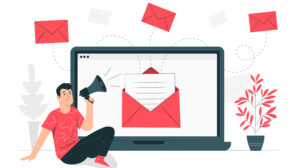With so many advances in technology and encryption software, it’s easy to feel relatively safe online today. But as online security improves, hackers become more resourceful and resilient. In 2018, companies saw a 350% increase in cyberattacks, making them more prevalent than ever before.
Let’s get back to the basics and focus on some easy ways to increase your online security right now.
1. Update your passwords often
This one probably seems like a no-brainer and is drilled into our heads constantly, but having a strong password is one of the easiest ways to avoid an attack. Make your passwords complicated and unique, and change them often.
I know I’ve been guilty in the past of using weak passwords because remembering unique passwords can be a huge headache. But simple number sequences like “123” and proper nouns like family member names are easy to crack.
If you’re worried about forgetting your passwords, the easiest thing to do is write them down on a piece of paper. I have a special file folder in my office for this specific purpose. Just make sure not to leave this information somewhere sensitive like on a sticky note taped to your laptop.
If you don’t trust yourself to keep track of a paper copy, consider using a password manager or a browser like Opera, which has a password manager setting.
How often should you change your passwords? Your employer might force a password change every thirty days, but for personal accounts you should swap them out at least once a year—or any time you may have compromised your security.
2. Turn off autofill
Another way to increase your online security is by turning off the autofill feature in your web browser. Saving information in your browser might seem incredibly convenient, but this practice could leave you vulnerable to an attack.
Phishing malware can specifically target autofill cookies and can wreak havoc if you have credit card information and other credentials saved in your browser.
Proofpoint uncovered Vega Stealer just last year. Researchers found this bad code hidden in marketing campaign emails as a simple payload, but with further development it could become more aggressive. All the more reason to turn off the autofill feature.
3. Be careful on public Wi-Fi
Public Wi-Fi is never secure. Whether you’re at the airport or a coffee shop, you should always be cautious on a shared network.
Never access any websites that require your password on public Wi-Fi—especially bank accounts and email.
In fact, email accounts are one of the most valuable tools for hackers and highly susceptible to brute-force attacks because they provide access to hundreds of accounts with saved financial credentials.
If you use public Wi-Fi often, like I do, consider purchasing your own personal hotspot from your ISP or use your phone as a hotspot to avoid a security breach.
A VPN is another helpful tool to increase your security when using public Wi-Fi, allowing you to encrypt your information shared along the public connection.
4. Don’t accept AirDrop messages from strangers
Another simple way to increase your online security is to never accept AirDrop messages from strangers. AirDrop has struggled with security issues in the past, which is why it’s a good idea to change your settings to “contacts only.”
Even if you think it’s fun to accept random images from people in public spaces like the train, the files you accept could contain viruses or malware, so be cautious.
5. Keep a close eye on finances
Even with the best security measures in place, you should still be diligent in keeping a close eye on your finances.
Many banks will alert you of suspicious activity, but credit card thieves can be tricky and often try to mimic normal purchasing behavior. Recently, I caught a $60 fraudulent purchase in my credit card statement to a retail website I visit often.
You should review your credit card transactions every few weeks to avoid paying any unnecessary expenses. Finance and budget apps can also be helpful in keeping track of your spending.
6. Don’t overshare
One final simple way to increase your online security is to avoid oversharing. Keep your accounts private when you can, and avoid giving away personal details like your birthday and address or names of family members.
When traveling, keep your location hidden—at least until you return home—to protect your empty home from burglars who want to take advantage of your absence. It’s difficult not to post often on vacation, but the less information you put out there, the more secure you’ll be.
Whether you’ve become complacent with your online security or feel a little paranoid, these simple measures will help keep your information out of the hands of cyber criminals.
Remember to change your passwords often, turn off autofill, be wary of public Wi-Fi, decline anonymous AirDrop messages, watch your finances like a hawk, and monitor what personal information you include in your social media.




